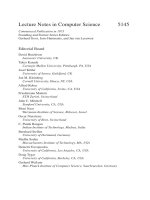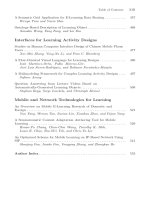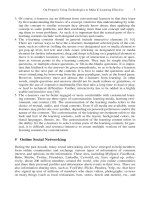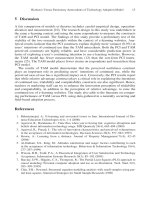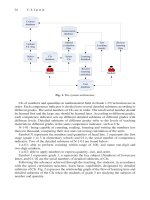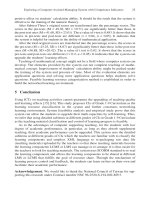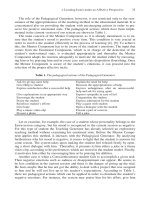Lecture Notes in Computer Science- P44 pdf
Bạn đang xem bản rút gọn của tài liệu. Xem và tải ngay bản đầy đủ của tài liệu tại đây (366.22 KB, 5 trang )
204 I. Moon et al.
Fig. 11. Writing C source code Fig. 12. Making a file for compilation
Fig. 13. Execution Fig. 14. Results returned
Qualitatively, the system effectively helps students to easily learn the C Language
syntax and programming. The integration of multimedia education contents with the
web-based C compiler support system enables students engage in C programming
exercises, any time and any where, provided they have access to the internet.
Fig. 15. On-line report writing and submission
Virtual Education System for the C Programming Language 205
2.3 Online Report and Examination
Learners' activities for report materials in the lecture notes content are shown in Fig. 15.
They are saved on the database and can be restored in printout form, as shown in Fig. 16,
which is given a unique ID for preventing duplication. Learners must hand in printouts to
teachers for evaluation.
Fig. 16. Printout of report
3 Student Response to C Programming Lecture
Since 2001, students have been surveyed about a C programming lecture in four
courses, at Soonchunhyang University, Korea. Over 50 students completed the survey
each year, rating 6 statements on a five-point scale, ranging from ‘strongly agree’ to
‘strongly disagree’. More than 80% of students selected ‘SA(Strongly Agree)’ or
‘A(Agree)’ when answering these questions. The survey results are encouraging. The
authors believe that these results demonstrate that the C programming lecture en-
hances the students’ understanding of C programming.
Table 1. Font sizes of headings. Table captions should always be positioned above the tables.
Question SA A N D SD
1. This content helped me understand the C programming
lecture.
33 48 13 3 1
2. Flash Animation helped me understand the concept of an
algorithm
35 58 6 1 0
3. Java applet quiz helped me understand the syntax of the
C language.
25 55 16 3 1
4. The C laboratory exercise improved my programming
skills.
30 62 7 0 1
5. The web-based C compiler helped me learn C
programming.
28 52 14 4 2
6. The C laboratory exercises were many and varied. 24 56 15 3 2
206 I. Moon et al.
4 Conclusions and Future Work
We have implemented an efficient and cost-effective virtual education system for C
programming, which can be used to enhance the quality of C programming education.
The use of a simple and user-friendly design, enables a high number of people to
easily access the virtual education system. Thus, advanced training using our virtual
education system will be available, even when an expensive C compiler is not pro-
vided for the students’ PCs.
Our virtual education system has two important components: a virtual learning sys-
tem and an evaluation/management system. The virtual learning system provides a
very effective and convenient learning environment, based on lecture notes for the C
programming language, using creative multimedia content such as Flash movies and a
Java Applet. This enables learners to easily understand the subject. The virtual learn-
ing system also provides a web-based compiler that compiles C programs at the server
side. These programs are submitted by students, through the Internet. The server re-
turns their execution results to the students' PC, thus, students need not install their
own C compiler on their PCs.
Students' activities such as attendance, reports and examinations are all stored and
evaluated by the evaluation/management system. The evaluation/management system
for attendance checking, report assignment, online examination and scoring, etc is
implemented using web technologies such as HTML, Java, Java script, PHP and
MySQL database. Although education is provided virtually through the internet, teach-
ers can effectively observe and advise students with the assistance of our evaluation
and management system, because our system provides different types of statistics for
teachers, such as the correct answer ratio and degree of difficulty about each question.
Our system enables students to easily understand the contents and programming
techniques of the C programming language. It enables lecturers to achieve higher
productivity, saving them time and labor.
Future work includes:
∗ Implementing a discussion group or Frequently Asked Questions (FAQs), to
provide more channels for student discussion.
∗ Supplementing this virtual laboratory with synchronous communication meth-
ods, such as video conferencing, so that instructor and students can interact di-
rectly in real-time.
∗ Updating this virtual Laboratory for a study of the effect on student learning
outcomes.
References
1. Eliot, C., Neiman, D., LaMar, M.: Medtec: A Web-based intelligent tutor for basic anat-
omy. In: Proc. 2nd World Conf. WWW, Internet Intranet, pp. 161–165 (1997)
2. Brusilovsky, P., Miller, P.: Web-based testing for distance education. In: Proc. World Con-
ference WWW Internet, pp. 149–154 (1999)
3. Sepe, R.B., Short, N.: Web-based virtual engineering laboratory(VE-LAB) for collabora-
tive experimentation on a hybrid electric vehicle starter/alternator. IEEE Trans. Ind.
Appl. 36(4), 1143–1150 (2000)
Virtual Education System for the C Programming Language 207
4. Gillet, D.: The cockpit: An effective metaphor for Web-based experimentation in engi-
neering Education. Int. J. Eng. Education 19(3), 389–397 (2003)
5. Rosson, M.B., Carroll, J.M.: Usability Engineering Scenario-Based Development of Hu-
man-Computer Interaction. Morgan Kaufmann, San Mateo (2002)
6. Chang, K.E., Chen, S.W., Hsiao, R.S.: A programming learning system for beginners - A
completion strategy approach. IEEE Trans. Education 43(2), 211–220 (2000)
7. Davidovic, A., Warren, J., Trichina, E.: Learning benefits of structural example-based
adaptive tutoring systems. IEEE Trans. Education 46(2), 241–251 (2003)
8. Daly, C., Horgan, J.M.: An automated learning system for Java programming. IEEE Trans.
Educ. 47(1), 10–17 (2004)
9. Wallace, D.R., Mutooni, P.: A comparative evaluation of world wide web-based and class-
room teaching. J. Eng. Education 86, 211–220 (1997)
10. Burks, O.: HyperCard courseware for introduction to circuit analysis. In: ASEE Annual
Meeting, pp. 496–500
11. Hwang, G.: A test-sheet-generation algorithm for multiple assessment requirement. IEEE
Trans. Education 46(3), 329–337 (2003)
12. Tartaglia, A., Tresso, E.: An automatic evaluation system for technical education at the
university level. IEEE Trans. Education 45(3), 268–275 (2002)
13. Russell, M., Goldberg, A., O’Connor, K.: Computer-based testing and validity: A look
back into the future. Assessment Education 10(3), 279–293 (2003)
14. Renshaw, A.A., Reibel, J.H., Zukowski, C.A., Friedman, M.B.: An assessment of on-line
engineering design problem strategies. IEEE Trans. Education 43(2), 83–91 (2000)
15.
16.
research/ccaa/sorts.html
17.
F. Li et al. (Eds.): ICWL 2008, LNCS 5145, pp. 208–220, 2008.
© Springer-Verlag Berlin Heidelberg 2008
Development of Contents Improving the Effectiveness of
Self Learning, for the C Program Language
Saeron Han, Ilhyun Moon, Kwansun Choi , Dongsik Kim, Changwan Jeon,
Min Hong
1
, Sangyeon Woo
2
, and Heunggu Jeon
3
Electrical Communication Engineering, SoonChunHyang University
1
Division of Computer Science & Engineering
2
Division of Physical Education
3
Mirae Energy Tech. co.
, ,
{cks1329, dongsik, jeoncw , mhong, sywoo}@sch.ac.kr,
Abstract. The web affords unique opportunities to assist students in learning. Due
to the rapid proliferation of the web in recent years, many educators seek to im-
prove the effectiveness of their instruction by providing innovative web-based
course material to their students. In particular, many web-based educational con-
tents are being developed. It helps to teach and train students. It is spreading
widely due to repeated learning any time, any where. In this paper we imple-
mented C functions and quizzes for checking comprehension of statements in a C
programming lecture, developing scenario related concepts and algorithm com-
prehension. We used visual representation. The web-based contents were imple-
mented as FLASH animations or Java applets.
Keywords: Web, FLASH , JAVA APPLET , ANIMATION.
1 Introduction
With the development of information communication, the information oriented wave
that has been revolutionizing the social environment is also having a similar effect on
the educational environment. To meet the needs of a rapidly changing information-
intensive society,, the student needs to master new techniques and knowledge while
working The student needs easy access to education and training for a change of his
or her occupation. It is gradually becoming increasingly clear that education available
via the web is important. In the modern society of the information age, education is
being taken out of the lecture room through the development of high technology. The
concept of learning is extended to the wide area of an information network. The rapid
development of the computer network, with the emergence of the web, has changed
the face-to-face method of traditional education, into teaching-learning between
teacher and student which is not face-to-face and free from constraints of time and
space, since we are using a variety of communication methods. Whenever and wher-
ever we choose, we can easily learn using internet. Because of such advantages, many
